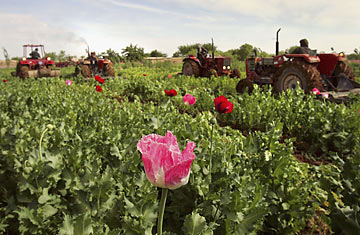
Members of the Afghan Eradication Force plow over opium poppies on April 3, 2006 in a field near Lashkar Gah in the Helmand province of southern Afghanistan.
(2 of 2)
These counter-narcotics officials point out that other swathes of eastern Afghanistan have been cleared of opium poppy without igniting revolt. They also argue that if the poppy is allowed to ripen, wily drug traffickers will find ways of harvesting it even if Marjah is ringed by 5,000 Marines. Says Gretchen Peters, author and expert on Taliban drug ties with traffickers: ""Counter-narcotics, just like counterinsurgency, is like playing the arcane game of whack-a-mole. You knock it out in one place and it pops up somewhere else."
Marjah's poppy planters, for their part, insist they had no choice but to plant. The Taliban, some say, told them to grow the crop to fund the insurgency. But farmer Khan disagrees. "Nobody forced us," he insists. It's simple economics: Opium pays far better than the wheat and grapes that Marjah's farmers used to grow. The same goes for the Taliban, of course. According to U.N. experts, the insurgents last year reaped nearly $300 million from the drug trade, though Afghan officials put the figure far lower, at between $80-100 million.
"Even if it's 'only' $80 million, that's still enough to fuel the insurgency for a year," says one counter-narcotics agent. And nearly all of the Taliban's drug profits came from Helmand province, and from Marjah in particular, an area experts say is probably the world's biggest illegal producer of opium poppies.
The local drug lords make themselves inconspicuous in the town. Marjah has no gaudy narco-mansions — Afghan drug lords build their palaces, and bank their money, in Dubai — and there are none of the vicious turf wars that characterize the Mexican and Colombian drug cartels. "There's enough to go around for everybody," says one Western drug agent who visited Marjah.
In Marjah, Taliban commanders had a hand in every facet of drug operations, according to agents. They collected a tithe from farmers (as do corrupt government officials in other areas); at harvest time, Taliban fighters put down their AK-47s and help in the poppy fields; they guard heroin labs and ride shotgun on smugglers' convoys across trackless deserts into Pakistan and Iran. Says Gen. Daoud Daoud, the Interior Ministry's chief of Counter-Narcotics, "The Taliban are involved in international networks, along with Iranians, Pakistanis, Tajiks and Germans."
Having decided to flee ahead of NATO's arrival in town, some of the traffickers — locals and drug experts believe— fled south to Pakistan's empty Baluchistan desert, while others are holed up in the nearby mountains of Musa Qala and the rest de-camped to Nimruz province, along a major smuggling route.
Fresh challenges await McChrystal's plans to bring good governance to Marjah. The drug traffickers can still flash around large wads of cash, and it may be difficult for some Afghan officials, newly arrived in town with their slender wage packets, to resist a bribe. Farmer Khan has noticed that in the past, "when there is no Taliban, the government men are taking money from the smugglers to help them move drugs across the border."
Some locals fear an upsurge in confrontation in the weeks ahead. Says Shaistah Gul, "When the trees and fields get greener and bigger, the Taliban will show themselves again, and the Americans will start their raids. It will be hard for us."
With reporting by Muhib Habibi/Kandahar
